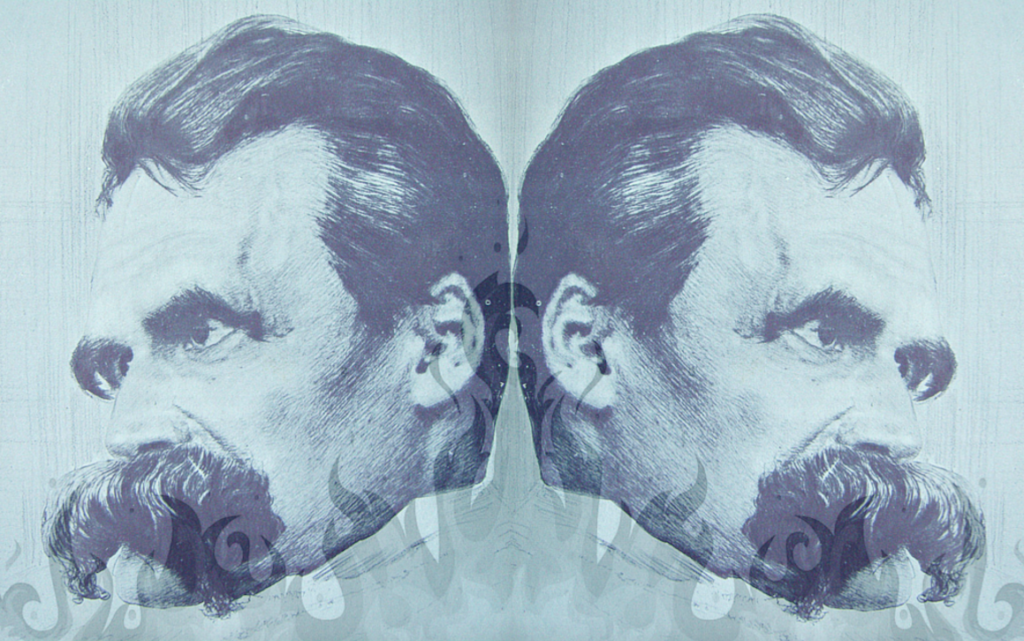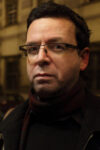
“Honored listeners,” “Honored listeners!” “Honored audience!,” then back to “Honored listeners!” for the final two lectures. So Nietzsche would greet those assembled at Basel’s city museum in the early months of 1872 to hear the talented young philologist and recent university hire speak “On the Future of our Educational Institutions.” (republished by NYRB as Anti-Education). What begins as decorum takes on a comic tone as you read these five lectures, not because Nietzsche disrespects the occasion, but rather because he takes the topic so seriously. Why cow to the expectation of scientific analysis when you can employ the far richer philosophical form of the dialogue? In lieu of a traditional lecture Nietzsche relates a conversation he claims to have overheard in his student days between an esteemed philosopher (a thinly veiled Schopenhauer) and his former student. What makes these opening salutations so darkly funny is that he pushes this implausible conceit to its limit, while also setting a goal that has become uncommon to the modern lecture series – to leave these honored listeners unsettled. Why offer a set of reforms when your goal is to tear down the whole system of values upon which your current society is built?
Despite the fact that Nietzsche is delivering his lectures in Basel, tucked just inside Switzerland’s northern border, his remarks are exclusively concerned with the educational institutions of 19th century Germany (or, at that point, Prussia). The gymnasium, the research university, and even the early childhood education (kindergarten) of his time were the envy of the world. They have indelibly shaped our own educational institutions, making these lectures not as culturally insular they might seem to the modern reader. Why is Nietzsche so troubled by the direction of German education, a system which clearly benefitted his own development as a thinker and awed visiting students and college presidents from the United States? He bundles his criticisms to make a broader point about education’s place in a healthy culture. In doing so he is participating in a kind of totalizing critique that is sorely lacking in contemporary discussions about education. But before moving on to this broader point there are at least four clear threads that are important to tease out.
The first could be described as the primary thesis or main analytic point of the lectures — that educational institutions are being subject to a contradictory and incoherent set of reforming impulses. “We need to distinguish between two dominant trends,” says the philosopher’s pupil, “apparently opposed but equally ruinous in effect and eventually converging in their end results. The first is the drive for the greatest possible expansion and dissemination of education; the other is the drive for narrowing and weakening of education.” Nietzsche is referring here to two groups who had used educational institutions to improve their standing and power in German society – the burghers and the scholars. Both drag education down by setting it low, common measures of achievement.
During the early years of the 18th century university enrollments were declining, partly due to the ill repute of faculties in which “scholasticism was the method and orthodoxy the content of instruction,” to quote one historian of the German university, partly due to the ill repute of unruly students. However, enterprising burghers began to use educational institutions to their advantage, and in many cases supplanted the aristocracy in certain sectors of society, such as assuming influential roles in emerging bureaucratic structures of government or in the growing commercial sector. This made university study extremely attractive to the middle class and the state which sought good civil servants. Germany only became a nation one year before Nietzsche’s lectures, but the mutual bind between the state, the economy, and the burghers was clearly underwriting the expansion of educational institutions, just as mass education was central to the state building project of the United States in providing a path towards “respectability” for those aiming to enter its mainstream. Needless to say, to a young Nietzsche in the thrall of Schopenhauer and Wagner, this form of mass education could only lead to philistine ends.
The narrowing and weakening trend was best exemplified by university scholars, a group that Fritz Ringer memorably called “the German Mandarins.” The modern research university was founded in Berlin in 1810, and what distinguished German universities from older institutions like Oxford, Bologna, or Salamanca was their embrace of Wissenschaft, a term often translated as “science” but more accurately could be rendered “organized scholarly inquiry.” Quite simply these German Mandarins were knowledge producers, and by growing the general fund of human knowledge through disciplinary research they attracted a great deal of prestige and redefined our expectations of what a professor could be—namely wise, useful, and in some cases even relevant to the needs of society. But this achievement came at a cost. Just as each newly minted PhD is (absurdly) meant to have made an “original scholarly contribution” to their field, and each peer reviewed article (absurdly) to fortify the house of intellect, the passion for science in Germany pushed scholars into ever more arcane fields of study and divested knowledge from holistic concerns about values, purposes, and the spirit of the age.
The three other threads are related to this general thesis and should also strike the honored 21st century readers of Anti-Education as extremely prescient. If educational institutions are subject to contradictory impulses, then it’s reasonable to assume that they are suffering from an identity crisis. Thus Nietzsche’s second point is that there has been a blurring of internal and external educational imperatives, which has surrounded the topic with a fog of confused positions. If teachers found their value in the pursuit and dissemination of knowledge, and students their value in self-cultivation (Bildung) by coming into contact with, as Matthew Arnold wrote, “the best which has been thought and said,” then how had educational institutions so easily embraced and placed at their heart modern concerns of general economic expansion? Utility? The political concerns of the nation-state? Once our debates have become timely in this way, they are an exercise in futility for Nietzsche. Even today, try talking to a committed education reformer who moves point by point through a set of “problems” and “solutions,” but is incapable of even entertaining the thought that the whole conversation may be off-kilter because it ultimately sustains values that undercut education. In fact it was in Nietzsche’s Untimely Meditations, completed shortly after these lectures, that we get his most developed criticisms of educational debates.
The third thread about the “future of our educational institutions” is that teachers had become less than noble creatures, at both the university and the gymnasium levels. “My own experience,” the philosopher’s pupil tells us, “convinces me that the overwhelming number of teachers who have basically nothing to do with education or culture, and have ended up on this path, with these pretensions, solely because of a demand for instruction, must be what determines the orientation of the gymnasium today.” When education becomes a mass concern, a common job, then we are bound to find an abundance of teachers earning their “bread shamelessly prodding around [the shining world of antiquity] with a workingman’s hands and everyday tools.” While I don’t want to participate in the modern practice of teacher shaming (my mother was a special education teacher of unending devotion to her students, and having taught many pre-service teachers I would argue that a surfeit of good will, shamelessly exploited by administrators, is probably a stronger professional motivator than financial gain), there is something to Nietzsche’s point.
Like the pupil I will perhaps inappropriately speak from my personal experience, as someone with a PhD from one of America’s elite schools of education who has been left irrevocably scarred by the shameless prodding of educational scholars and the abysmal standards required of future teachers. In candid conversations with colleagues it was never hard to coax out the opinion that something had gone horribly wrong with an institution that had so clearly abandoned the project of measuring itself against high standards (truth, rigor, non-utilitarian goals, education for cultural development). The teaching profession is too varied to speak of it with any specificity (a classic gesture in vapid educational scholarship is to speak of “teachers” as a singular category), but Nietzsche is speaking about institutions. If we think about schools of education as hubs between different levels of the education system, then I think there is much to this critique.
This brings me to the fourth strand of the lectures, which I think makes this a particularly interesting book to think with today. What ultimately is the point of humanistic education, or appealing to any higher purposes (the pursuit of truth in the sciences, the formation of civic virtue in the humanities) when culture, the public sphere, the whole “present age” is so degraded and vulgar? “The newspaper epitomizes the goal of today’s educational system,” we hear, “just as the journalist, servant of the present moment, has taken the place of the genius, our salvation from the moment and leader for the ages.” In speaking of the press and the discomfiting temper of the age Nietzsche is placing himself right in the middle of the “long 19th century” and the particular form of social discontent that it bred. The ancient Greeks famously believed the philosophy began in wonder, but as Simon Critchley has recently argued, for moderns philosophy begins in disappointment. Nietzsche, the consummate “edu-hater,” to coin a phrase, shows that this shift can be especially generative when thinking of the future of our educational institutions.
In 1846, when Nietzsche was just two years old, his spiritual comrade to the north Søren Kierkegaard was already sounding these alarms. “A revolutionary age is an age of action; ours is the age of advertisement and publicity. Nothing ever happens, but there is immediate publicity everywhere.” Kierkegaard’s term for this in The Present Age is leveling. “While a passionate age storms ahead setting up new things and tearing down old, raising and demolishing as it goes, a reflective and passionless age does exactly the contrary: it hinders and stifles all action; it levels. Leveling is a silent, mathematical, and abstract occupation which shuns upheaval.”
Remember, this is 1846, on the cusp of a series of great revolutions across Europe in 1848. Is Kierkegaard mischaracterizing the age in a fit of overworked Danish melancholy? Clearly not if you keep in mind that history has shown over and over again that the counter-revolution is stronger than the revolution itself. But also clearly not if we accurately characterize his critique of the present age, which Bernard Yack has called “the longing for total revolution.” Dating back to Rousseau a certain shared vocabulary was emerging – ressentiment, amour-propre, alienation – amongst the most passionate of Europe’s social critics. These critics also shared the synoptic, totalizing language that allowed them to speak of an age, a spirit, a maddening chasm between the realm of freedom and the realm of necessity, or the world of perception and thing-in-itself. In this genre of critique the key gesture, according to Yack, is 1) to totalize the spirit of the age, 2) to fix on some feature of the age that is frustrating our newly stoked desire for freedom, development, or fulfillment, and 3) to passionately advocate for the removal of the thing that blocks that desire. For Rousseau reconciliation for a degraded humanity is sought in the political community; for Friedrich Schiller in the sentiments (through the aesthetic education of man); for Kant in the ethical sphere through establishing a “kingdom of ends”; for Hegel in the State; for Marx in political economy; for Nietzsche, at this point in his thinking, in culture and its redemptive figure, the genius; and for Kierkegaard, who gets left out of Yack’s study, in religion and the capacity for passionate commitment, the “purity of heart” that is so enfeebled in the present age.
Yack ultimately concludes that each of these projects harbor internal contradictions (especially in the freedom/necessity, or humanity/nature dichotomies), but that they fall short is no damning criticism, for each registers a life lived with this feeling of discontent. Remember, once this becomes a feature of your worldview, philosophy can only properly begin in disappointment.
Anti-Education sent me back to The Present Age because the language between the two is so similar. Each is an occasion to register some large disappointments. Though his topic is purportedly educational institutions, Nietzsche spends a great deal of time castigating journalists. They lack seriousness, institute a cultural anarchy, and degrade language. “If certain words and turns of phrase habitual in today’s journalism do not inspire physical disgust, then abandon your pursuit of culture.” (Nietzsche singles out “to call for,” “to pocket,” “seize the initiative,” “it goes without saying,” and “take into account.” Thank God Nietzsche was spared reading a job advertisement on MediaBistro.) Two and a half decades prior Kierkegaard makes a similar point: “In order that everything should be reduced to the same level, it is first of all necessary to procure a phantom, its spirit, a monstrous abstraction, an all-embracing something which is nothing, a mirage—and that phantom is the public. It is only in an age without passion, yet reflective, that such a phantom can develop itself with the help of the Press which itself becomes an abstraction.”
Why might Nietzsche, like Kierkegaard, be so concerned with the vulgarity of the mainstream press? Why not keep a disdainful distance and stick with actual, not pseudo-cultural production and criticism? And again, how does this relate to a set of lectures on the future or our educational institutions? It is because Nietzsche is engaged in the kind of total critique that views institutions in terms of values—values which emerge within a matrix of institutions not easily disentangled from one another. When you see a pundit on TV news, or read a hot take on The New Inquiry, you may wonder why, at the end of the day, all this matters to the individual member of the press. What Nietzsche saw so presciently was how this passionless reflection, to paraphrase Kierkegaard, was also coming to define the scholar and other leaders of our educational institutions.
Again, this struck me as an incisive if not slightly amorphous point. One of the clearest impressions that remains from a disastrous graduate career in a particularly barren field of scholarship is that the overwhelming majority of articles and research projects are not affirmative in the sense that Nietzsche and Kierkegaard seek. What modern scholars who are fortunate (or strategic) enough to land a tenure track job ultimately seem to seek is comfort—of a steady paycheck with good benefits, of a tow hold in the shrinking middle class, of recognition and affirmation within their small scholarly community, in many cases of the least interesting bourgeoisie values you can imagine. Go to the MLA, the APA, the AAA, the AERA, and tell me in good faith that these exercises are necessary, i.e. if for example they were cancelled due to an extreme weather event (an intrusion of the real, a candidate for passionate commitment clearly pushed aside when you examine the incredibly wasteful way these events are catered), would it make a great difference in the lives of the attendees, or the discipline as it is practiced? This may read like an overly cynical view, and I am being unsubtly polemical posing the issue in this way. But in doing so I am doing what Nietzsche is demanding of his honored listeners, which is to suspend our conventional modes of thinking about education and push the conversation up several registers. “People democratize the right of genius,” we hear, “in order to avoid the true work of culture and demands of education.” “We should provoke terror the philosopher said, not just wonder.”
I wrote before that Nietzsche is the consummate “edu-hater,” in that there is a pedagogical intent to shitting on German society and its educational institutions. Here is another gem, this from “On the Uses and Disadvantages of History”:
[German education’s] goal, viewed in its essence, is not at all the free cultivated man, but the scholar, the man of science, and indeed the most speedily employable man of science, who stands aside from life so as to know it unobstructedly; its result, observed empirically, is the historical-aesthetic cultural philistine, the precocious up-to-the-minute babbler about state, church, and art, the man who appreciates everything, the insatiable stomach which nonetheless does not know what honest hunger and thirst are.
Whether out of respect, self-interest, or just convention our reverence toward our teachers is often misplaced. We expect scholars (humanists even!) to be wise and speak to elevated values beyond those of the marketplace, of utility, of the prevailing values of the present age. Maybe this is a faith of which we should be disabused. And maybe the best course of action is, as Nietzsche would later say, to philosophize with a hammer and avoid the system-building of his day and myopic pragmatism of today’s reform movement which shies away from these larger questions of value.
What makes Nietzsche different from today’s edu-haters is that he doesn’t feel it necessary to make some kind of recuperating gesture at the end of his pessimistic assessment. Hanging over these five lectures is the promise of a great artist coming to join the philosopher and his pupil. How this redeems is unclear (the artist does not arrive), and Nietzsche would come to abandon the Schopenhauerian fixation on genius as that which education aims to produce, or at least recognize and revere if we are lucky enough to have one come down the pike. But there is still a great deal we could learn from his negative approach. In their excellent introduction to Anti-Education Paul Reitter and Chad Wellmon compare Nietzsche to Mark Edmunson, William Deresiewicz, and Andrew Delbanco, three prominent critics of American education and its drift away from ennobling civic and humanitarian values. Reitter and Wellmon put the similarities and differences well:
Edumnson, Deresiewicz, and Delbanco try to win over readers by affirming the unique value of studying the humanities. The case they make isn’t a repurposing of the utilitarian logic favored by critics of the humanities: namely that the humanities teach transferable skills. It is a loftier position. In the hand of dedicated teachers, the humanities guide students through immersion studies in works that, exotic or irrelevant though they may seem, can change their lives as no other material can. Nietzsche shared this belief, but he was not content, as Edmunson, Deresiewicz, and Delbanco sometimes seem to be, to recite the credo.
In this sense the small description on the back of the book is likely to be misinterpreted – “Anti-Education presents a provocative and timely reckoning with what remains one of the central challenges of the modern world.” The challenge is not figuring out how to envision and defend an education system that retains these humanistic values against the philistine, utilitarian values of the modern world. This keeps us in the realm of redemption (hence the recitation, over and over again, of the humanist credo), and wards off the darker consideration of a modern society too far gone to produce an education worthy of any elevated measure we may set. The former is the realm of the reformer, and if nothing else is only going to breed more disappointment by freighting education with too great a task, like inverting the dominant values of the culture. The latter is revolutionary in Kierkegaard and Yack’s sense, placing education within a larger, totalizing critique of the age, a critique that is perfectly happy “raising and demolishing” while it only dimly and provisionally points a way forward. Here, with the disastrous legacy of total revolution in the “short twentieth century” in mind, we are in some dicey territory. Nietzsche’s idealized education is proudly elitist and anti-democratic. But I think it is disingenuous to speak of the future of our educational institutions without speaking of the degradation of language we confront daily in the public sphere, the clear legitimation crisis among the political and economic institutions education is meant to serve, and the thoroughly conservative and mediocre aspirations of the educated class. By all accounts the honored listeners in Basel received the lectures very positively, and I imagine there are still plenty of discontented souls of all stripes, whether they are excited or unnerved by these lectures, who would enjoy a little shade sent their culture’s way.
Michael Schapira is the Interviews editor at Full Stop and teaches Philosophy at Hofstra University.
This post may contain affiliate links.







